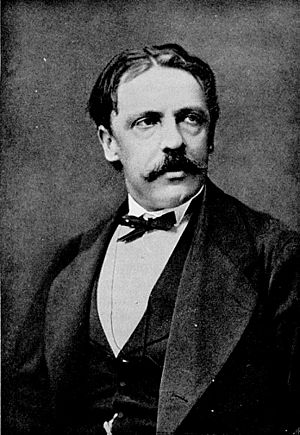Viktor Rydberg facts for kids
Quick facts for kids
Viktor Rydberg
|
|
|---|---|

Rydberg in 1876
|
|
| Born | Abraham Viktor Rydberg 18 December 1828 Jönköping, United Kingdoms of Sweden and Norway |
| Died | 21 September 1895 (aged 66) Djursholm, Stockholm county, United Kingdoms of Sweden and Norway |
| Occupation | Author, journalist, novelist, translator and poet |
| Nationality | Swedish |
| Period | Victorian, Oscarian |
| Genre | Romance |
| Subject | Mythology, Religion |
| Notable works | Singoalla, Undersökningar i Germanisk Mythologi I-II, Fädernas Gudasaga |
| Spouse | Susen Hasselblad |
| Relatives | Johann Rydberg (father), Hedvig Düker (mother) |
Abraham Viktor Rydberg (Swedish pronunciation: [ˈɑ̂ːbraham ˈvɪ̌kːtɔr ˈrŷːdbærj]; 18 December 1828 – 21 September 1895) was a Swedish writer and a member of the Swedish Academy, 1877–1895. "Primarily a classical idealist", Viktor Rydberg has been described as "Sweden's last Romantic" and by 1859 was "generally regarded in the first rank of Swedish novelists."
Biography
Viktor Rydberg was of humble parentage. One biographer notes that: "He had a hard struggle to satisfy the thirst for learning which was a leading passion of his life, but he finally attained distinction in several fields of scholarship." He was the son of a soldier turned prison guard, Johan Rydberg, and a midwife, Hedvig Düker. Viktor Rydberg had two brothers and three sisters. In 1834 his mother died during a cholera epidemic. Her death broke the spirit of his father, who yielded to hypochondria, contributing towards his loss of employment and the family's apartment, forcing authorities to board young Viktor out to a series of foster homes, one of which burnt down, further traumatizing the youth.
Despite his economic status, Rydberg was recognized for his talents. From 1838 to 1847, Rydberg attended grammar school, and studied law at the university in Lund from 1851 to 1852. Due to financial reasons, his university studies ended after one year, without a degree. Afterward, he took a job as a private tutor. In 1855, he was offered work at the Göteborgs Handels- och Sjöfartstidning, a newspaper in Gothenburg, where he remained employed for more than 20 years. It was during this time that his first novels saw print. He soon became a central figure of late Romanticism in Sweden, and Sweden's most famous living author.
Throughout his adult life, Rydberg was active in politics. In 1859, he wrote a pamphlet on national defense, which inspired the "Sharpshooter's movement", a voluntary militia of some political importance during the 1860s. In 1870, he took a controversial pro-German stance during the Franco-Prussian War. Representing the traditional economic system of Sweden, from 1870 to 1872, Rydberg was a member of the Swedish Parliament as a supporter of the Lantmanna Party. Having been a supporter of the Jewish cause since his youth, it was MP Viktor Rydberg who gave the keynote speech in the parliamentary debate to enact a law granting all non-Lutherans full civil rights. He worked diligently for working-class people and in 1906 his works on the labor question in both prose and poetry were regarded as part of the "treasury of this class." He also advocated language reform, purging foreign words from the Swedish language, particularly those of German origin. Around this time, he advocated a more Germanic spelling of his own name: Viktor, as opposed to Victor.
Throughout his life and career, Rydberg coined several Swedish words; many, such as gudasaga for the foreign mythologi, are still in use today. In 1884, he refused to support anarchist writer August Strindberg, in his blasphemy case. As a juror in an 1888 trial of socialist leader Hjalmar Branting, Rydberg voted to send him to jail for blasphemy. They never spoke to one another again. His apprehension of unregulated capitalism at the dawn of the industrial age is most fully expressed in his acclaimed poem Den nya Grottesången (The New Grotti Song) in which he delivered a fierce attack on the miserable working conditions in factories of the era, using the mill of Grottasöngr as his literary backdrop.
For his lifetime of literary achievement, Rydberg received an honorary doctorate from the University of Uppsala in 1877 and was elected a member of the Swedish Academy the same year. He served from 1883 as teacher, from 1884 as professor, of the History of Culture at Stockholms högskola, now Stockholm University, and from 1889 as the first holder of the J. A. Berg Chair of the History and Theory of Art there. In 1889, he was also elected a member of the Royal Swedish Academy of Sciences.
Rydberg died at the age of 66 on 21 September 1895 due to complications from diabetes and arteriosclerosis. Rydberg's passing was reported as far away as the United States of America, where the New York Times published an obituary titled: "Death of Prof. A.V. Rydberg, Career and Remarkable works of one of Sweden's Leading Men." A national day of mourning ensued all over Sweden. Today, his grave is a national monument. Many of his works have been translated and remain in print. His works are widely read in schools throughout Sweden, and his poem "Tomten" ("Santa" or "The Gnome") is a Christmas favorite, as well as the lyrics for Gläns över sjö och strand. A group of three charter high schools (Gymnasium) and one middle school in Stockholm, as well as a street in Göteborg, a student dormitory, and other buildings carry his name. He is still listed in many English language encyclopedias as an individual entry.
See also
 In Spanish: Viktor Rydberg para niños
In Spanish: Viktor Rydberg para niños

